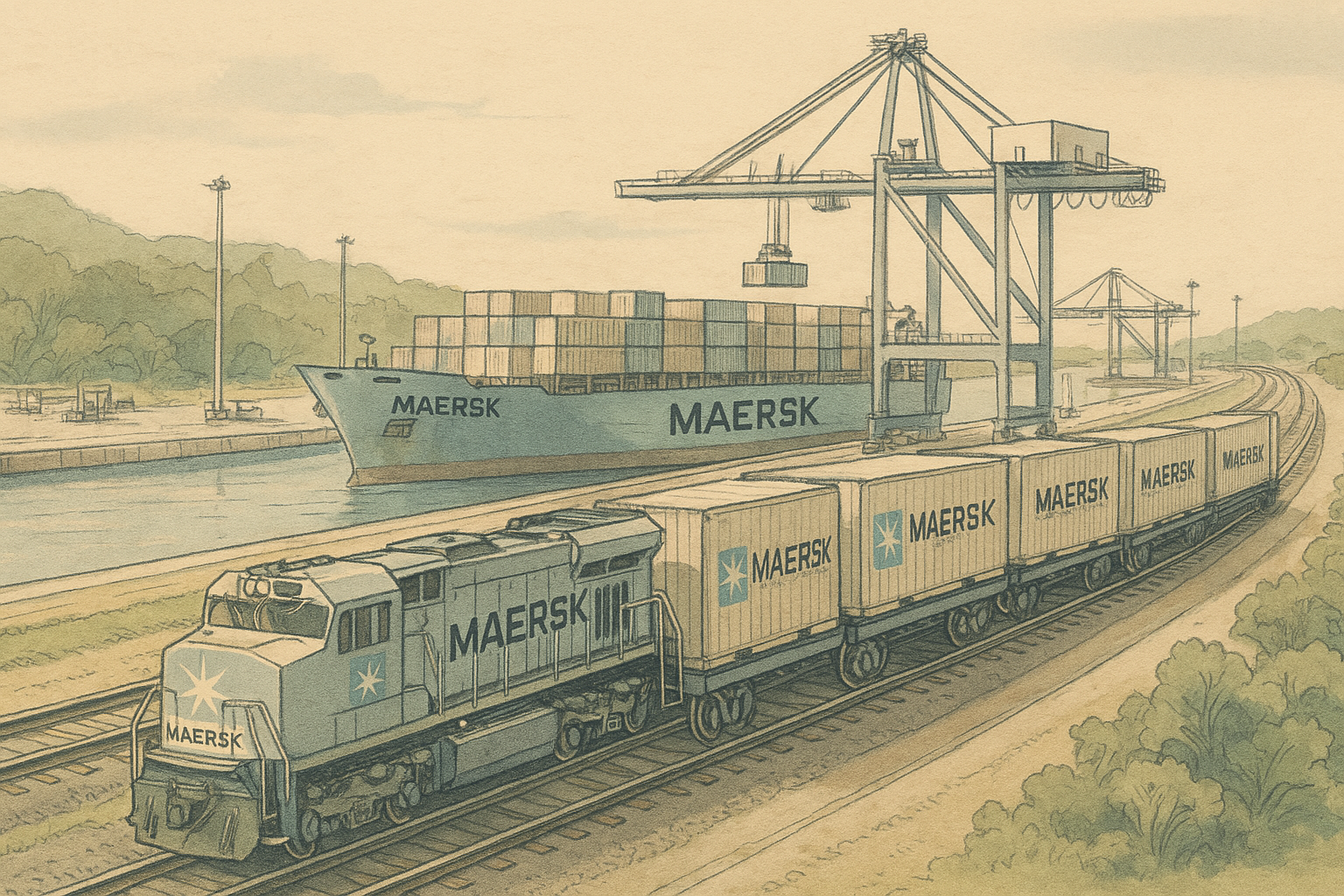Maersk's Strategic Rail Acquisition Shakes Logistics

In a bold and strategic move, Danish shipping giant Maersk has acquired the Panama Canal Railway Company (PCRC) through its subsidiary, APM Terminals. This marks Maersk's entry into railroad ownership, a surprising departure from its traditional maritime and terminal operations. The acquisition, completed for an undisclosed sum, signifies Maersk's ambitions to control critical logistics infrastructure, reinforcing its global position.
Why the Panama Canal Railway?
The Panama Canal Railway, a 76-kilometre (47-mile) track running parallel to the iconic canal, serves as a vital land bridge connecting the Atlantic and Pacific oceans. Established in 1998, the railway provides crucial logistics services, including intermodal container transportation and passenger transit. In 2024, it reported revenues of $77 million and an EBITDA (earnings before interest, taxes, depreciation, and amortisation) of $36 million, reflecting its economic viability.
Strategically, PCRC offers substantial value beyond its financial performance. Its proximity to one of the world's most critical shipping lanes enhances Maersk's logistical capabilities and provides alternative routing for cargo. This is particularly valuable during disruptions, such as droughts or geopolitical tensions, which frequently affect canal operations.
Strategic Benefits for Maersk
Maersk's acquisition underlines its vision to transition from a traditional shipping company into a fully integrated logistics provider. Owning PCRC enables Maersk to offer seamless, end-to-end logistics solutions, greatly enhancing operational efficiency. The integration of PCRC aligns perfectly with APM Terminals’ existing infrastructure and operations across the Americas.
Control of the railway not only solidifies Maersk’s presence in the Americas but significantly increases its ability to manage supply chain disruptions. Given recent global logistics challenges, including port congestion and canal restrictions, Maersk’s ability to provide alternative land-based solutions is strategically advantageous. This new asset complements Maersk’s existing maritime and terminal assets, providing greater flexibility and resilience.
Moreover, Maersk’s customers, primarily global retailers and manufacturers reliant on consistent and efficient shipping routes, stand to gain substantially from this deal. It promises reduced transit times and more predictable delivery schedules, strengthening Maersk's appeal in the competitive logistics marketplace.
Why did Canadian Pacific Kansas City Sell?
On the selling side, Canadian Pacific Kansas City Limited (CPKC) and its partners, Lanco Group and Mi-Jack, viewed this transaction as a strategic realignment. Following its own merger, CPKC’s focus shifted strongly towards optimising its core business—rail transport across Canada, the United States, and Mexico. Selling the Panama Canal Railway, despite its profitability, represents a calculated decision to streamline operations and maximise shareholder value.
CPKC’s strategic realignment reflects a broader industry trend, where major logistics players are narrowing their focus to strengthen core operations. Selling PCRC frees CPKC from peripheral assets, allowing greater investment into its vast North American network, enhancing competitive advantage where it matters most to its operations.
Market Reaction and Impact
The logistics industry reacted positively to Maersk’s bold move. Analysts recognise this as a strategic investment that positions Maersk uniquely within the global logistics market. The control over an essential transit point complements Maersk’s existing network of port facilities, terminals, and ships. This acquisition emphasises Maersk’s commitment to intermodal logistics—a sector that is becoming increasingly critical as global trade complexity grows.
However, not all responses were unequivocally positive. Critics suggest Maersk might face integration challenges and unexpected operational complexities. Railway operations, distinct from shipping and terminals, require specialised expertise. While Maersk’s strategic direction is clear, successful implementation will depend heavily on effective operational management and skilled workforce integration.
Furthermore, some industry observers caution that over-reliance on the railway could expose Maersk to significant operational risks, such as rail-specific infrastructure failures or political risks associated with transit through Panama.
Implications for the Panama Canal Region
For Panama, Maersk’s acquisition could herald increased economic activity and infrastructure investments. Improved logistics capacity around the canal may attract further international business and investment, boosting local economies. Additionally, a major global player like Maersk could spur further modernisation of logistics infrastructure in the region, enhancing Panama’s long-term economic prospects.
On the flip side, some local stakeholders worry about increased foreign control of critical infrastructure, raising concerns about national economic sovereignty. How Maersk navigates its relationship with local regulatory bodies and the Panamanian government will be closely scrutinised in the coming months.
What's Next?
The real test for Maersk will be the integration and management of its new railway asset. Success depends heavily on the company’s ability to quickly adapt to railway operations, something entirely new to its current business model. Further, Maersk’s competitors may now be incentivised to make similar infrastructure investments to remain competitive.
Maersk’s strategic move could signal the beginning of more aggressive infrastructure acquisitions in the logistics industry, transforming traditional maritime and transport operations into more diversified and resilient global logistics networks.
World Liberty Seeks Federal Trust Charter
World Liberty Financial, the crypto venture backed by the Trump family, has applied for a US national bank trust charter... Read more
Saudi Banks Tap Overseas Markets
Saudi Arabia’s banks are borrowing from international markets at their fastest pace on record, as lenders try to squar... Read more
Amazon Continues To Cut 16000 Gone
Amazon has announced plans to cut a further 16,000 roles from its corporate workforce, extending the cost and organisati... Read more
The UK May Have A Voice In Ai
Europe’s AI sector has grown accustomed to playing catch-up. Capital has flowed more slowly than in Silicon Valley, va... Read more
Musk Applies Pressure To BT
Britain’s broadband market has spent the past decade locked in a familiar pattern. Incumbents invested heavily in fibr... Read more
Blackrock Sees EMEA Moving Into Private Assets
BlackRock has warned that investors across Europe, the Middle East and Africa are reshaping portfolios in response to wh... Read more

